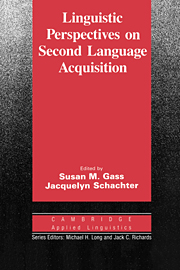Book contents
- Frontmatter
- Contents
- List of contributors
- Series editors' preface
- Introduction
- I THEORIES OF ACQUISITION
- Chapter 1 Second language acquisition theory: the case for a generative perspective
- Chapter 2 What is the logical problem of foreign language learning?
- II SYNTAX
- III SEMANTICS/PRAGMATICS
- IV LEXICON
- V PHONOLOGY
- Index
Chapter 1 - Second language acquisition theory: the case for a generative perspective
Published online by Cambridge University Press: 05 October 2012
- Frontmatter
- Contents
- List of contributors
- Series editors' preface
- Introduction
- I THEORIES OF ACQUISITION
- Chapter 1 Second language acquisition theory: the case for a generative perspective
- Chapter 2 What is the logical problem of foreign language learning?
- II SYNTAX
- III SEMANTICS/PRAGMATICS
- IV LEXICON
- V PHONOLOGY
- Index
Summary
The ultimate goal of second language acquisition research is the development of a theory of second language acquisition. I think there is fairly widespread agreement that no such theory exists; beyond that rather minimal point, the consensus starts to dissolve. Once we get to questions about the likely nature of the theory we are seeking, we find all kinds of differences of opinion. What would a second language acquisition (SLA) theory look like if it existed? What would it explain? What kind of evidence would be legitimate to use in support of it? There has been disappointingly little said in explicit answer to these questions, and the field of second language acquisition research is the poorer for this lack of attention to what are, after all, fundamental questions. In what follows, I want to show how thinking about questions of this sort can help to straighten out some unfortunate and unnecessary confusions in the literature.
More specifically, I propose to take a closer look at the two key words in the term second language acquisition: language and acquisition. I will suggest how a particular approach to the study of the former could help us gain a more precise understanding of the latter. More specifically still, I will try to show that a linguistic theory of the kind perhaps currently best exemplified by Chomskyan generative grammar could give us insights into SLA not available from other linguistic theories.
- Type
- Chapter
- Information
- Linguistic Perspectives on Second Language Acquisition , pp. 15 - 40Publisher: Cambridge University PressPrint publication year: 1989
- 20
- Cited by



